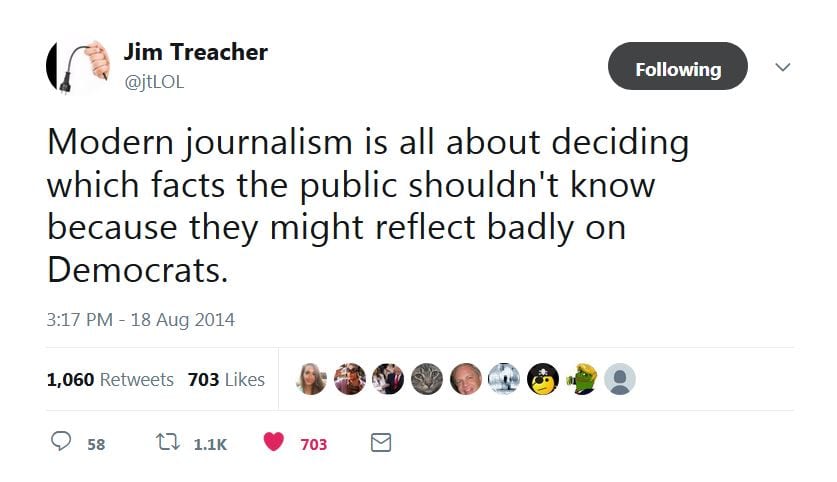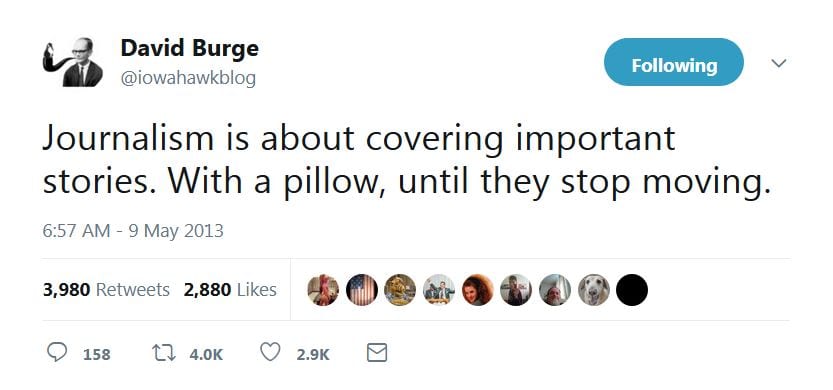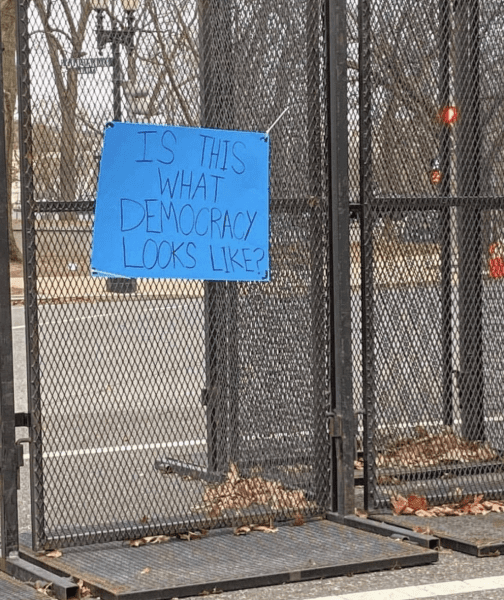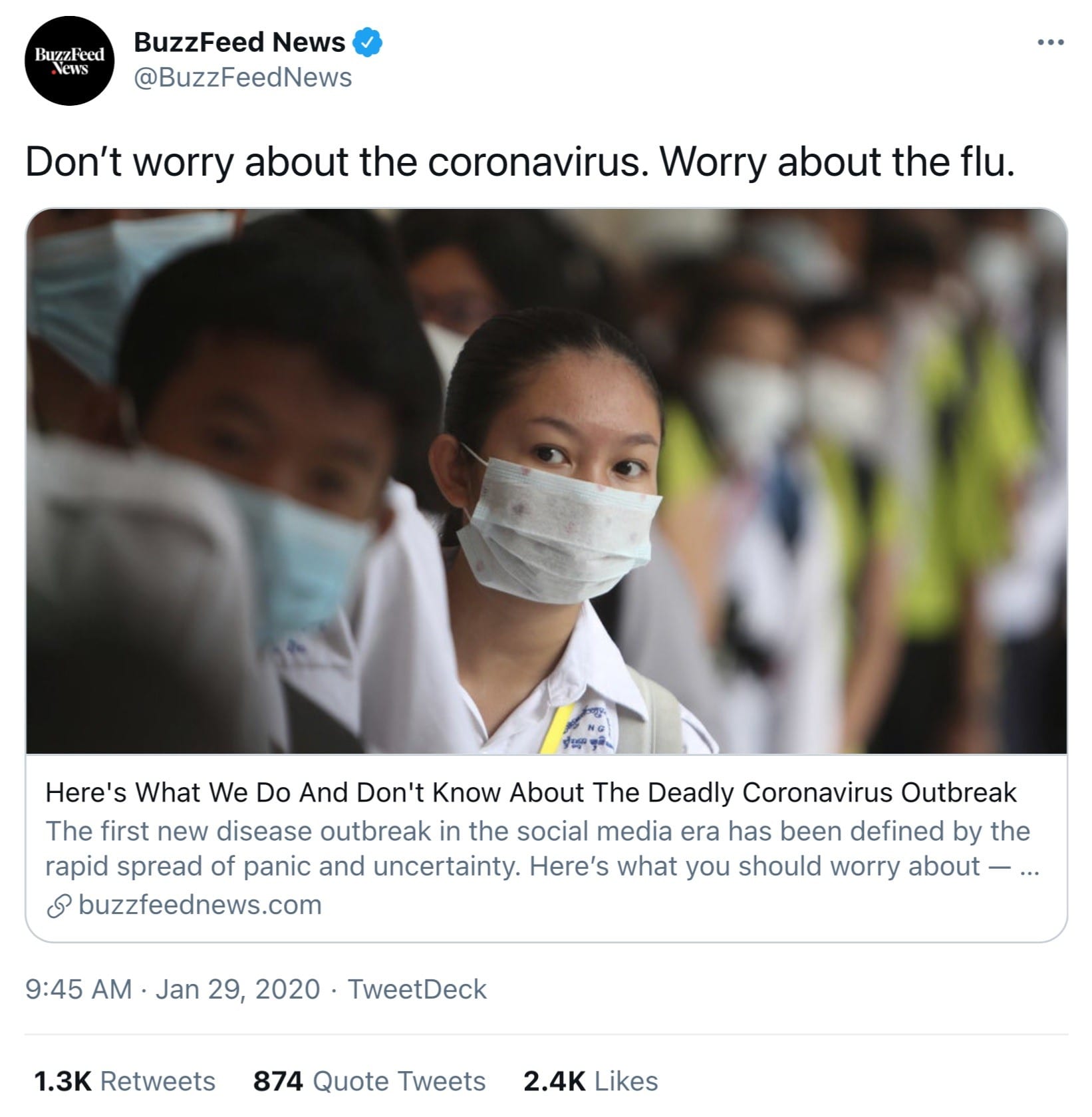Just think of the media as Democratic Party operatives with bylines, and it all make sense.
Evergreen:


Just think of the media as Democratic Party operatives with bylines, and it all make sense.
Evergreen:


A PICTURE FROM DC, VIA A FRIEND:

YOU AND I HAVE A RENDEZVOUS WITH SCARCITY: Gas Taxes May Soon Increase. Here’s Why That’s Especially Bad News for the Poor and Middle Class.
“MAY.” White House Report Card: Biden’s unity call goes poof, but may have ‘governing majority.’
Speaking of majorities, if Patrick Leahy presides over the impeachment — since Chief Justice Roberts has refused — that means Kamala Harris won’t be presiding over the Senate, which means she won’t be available to break a tie, meaning that there won’t actually be a majority in the Senate.
TANDEN’S OMB APPOINTMENT CAUSING FRICTION WITH BERNIE BROS: When then-President-elect Joe Biden announced last November his intention to nominate Center for American Progress (CAP) chief Neera Tanden, the Democratic-Socialist wing of the party was angered. Capital Research Center’s Shane Devine explains why.
THIS IS CNN: ‘Here’s a good place to start!’ CNN asks why there’s such a deep political divide and gets handed all the mirrors.
CNN’s Parkland “town hall” was a key mile marker on the way to our current polarization.
As was this: Who Is John Sullivan, Who Was the Woman With Him and Their Appearance on CNN After the Capitol Hill Riot?
KAROL MARKOWICZ: The future is Florida.
New York Gov. Andrew Cuomo’s adviser Rich Azzopardi ridiculously speculated that Florida was hiding its real statistics. When a former head of the New York state Democratic Party embarrassed the Cuomo administration by flying to Florida to get his coronavirus vaccine, Cuomo spokesman Jack Sterne responded, “Anyone holding Florida up as a good example of anything during this pandemic needs to have their head examined.”
But what else could the Cuomo crew say? New York’s economy lies in ruins, while Florida is poised to bounce back. Florida’s unemployment rate for December 2020 decreased to 6.1%, below the national average of 6.7%. New York state’s was 8.2%, with New York City at 11.4%. And these numbers don’t include Cuomo’s late-December arbitrary shutdown of indoor dining in New York City. The same month, California was at 8.8% and Texas was at 7.2%.
DeSantis didn’t just stop statewide lockdowns. He also used executive powers to proscribe local governments from using lockdowns without reason. A September order, which DeSantis renewed in November, said that “Floridians should not be prohibited by local governments from working or operating a business” and that “restaurants, including any establishment with a food service license, may not be limited by a COVID-19 emergency order by any local government to less than fifty percent (50%) of their indoor capacity. If a restaurant is limited to less than one hundred percent (100%) of its indoor capacity, such COVID-19 emergency order must on its face satisfy the following: i. quantify the economic impact of each limitation or requirement on those restaurants; and ii. explain why each limitation or requirement is necessary for public health.”
When compared to California, which closed outdoor dining despite no evidence such activities were spreading the virus, or New York, which closed indoor dining in New York City only, despite the city having the second-lowest case rate in the state, Florida’s insistence on using actual metrics to show spread appears not reckless but diligent.
Read the whole thing. I was there last weekend to celebrate my aunt’s 100th birthday. One way or another, I’ll find out if Florida is the future about a week from now.
SALENA ZITO: Biden’s climate executive orders devastated these US workers in a day.
On the morning of Jan. 20, every room of the two-story Stroppel Hotel in Midland, SD, was filled with men and women who work on the Keystone XL pipeline. Most of these union laborers, welders and pipefitters started their day over a cup of coffee in the hotel’s common room before heading out to their jobs.
By 4 p.m., the entire place was cleared out, leaving the historic hotel silent for the first time since owners Laurie and Wally Cox took it over six months ago.
“Our whole world turned upside down with the stroke of a pen,” Laurie said.
She is speaking of President Biden’s executive order, signed on his first day in office, that halted work on the Keystone XL pipeline in South Dakota and immediately eliminated 1,000 union jobs. TC Energy, the company that was developing the project, predicts that more than 10,000 jobs will be lost in 2021 due to the order.
Now Laurie, who holds a master’s degree in social work, sits alone in the vacant hotel while her husband Wally finds work as a millwright hours away. She starts to cry as she recalls how they bought the building in late September and quickly turned it into an affordable and social place for pipeline workers to stay.
Just get different jobs, say the Democrats busy destroying them.
THE NEW YORK TIMES, A YEAR AGO: New York Braces for Coronavirus: ‘It’s Inevitable.’ In Queens, some who recently returned from China have even self-quarantined. But officials have urged calm.
The London Independent, a year ago: ‘If it happens, it happens’: In New York City’s Chinatown, it’s business as usual despite coronavirus fears.
And BuzzFeed, a year ago:

OPEN THREAD: What are you doing to make things better?
JAKE TAPPER: Here’s CNN’s ‘King of Truth’ spreading the lie that Jacob Blake was unarmed.
When the press worries about people “spreading misinformation” on the Internet, it’s not worried about the misinformation. It just doesn’t want competition in the spreading.
WHERE’S HUNTER, FAT? Hiding Hunter Biden laying low in LA, starting art career with shady dealer.
WHAT A REAL SPACE PROGRAM LOOKS LIKE: SpaceX has two Starship prototypes on the pad at the same time. “It looks like a scene from science fiction: Two gleaming silver rocket ships standing side-by-side under the Texas sun awaiting their turn to fly. But the shiny, finned SpaceX rockets — Starship SN9 and SN10 prototypes — actually exist and met at the pad for the first time Friday (Jan. 29) at the company’s South Texas facility near Boca Chica Village.”
THE PALESTINIAN AUTHORITY PRAISES THE MASSACRE OF ISRAELI ATHLETES AT THE MUNICH OLYMPICS: Alas, that’s a dog bites man story. For decades, Palestinian children have been taught in school that they should hate Israel. When they grow up, they still do. But John Hinderaker makes a useful point about it at the end of his Powerline Post.
DISPATCHES FROM THE JUNIOR ANTI-SEX LEAGUE: Washington Post explains how sex is not the answer to stave off stock market mischief.
GREAT MOMENTS IN GASLIGHTING: Media’s ‘Biden Is the Greatest Catholic Since Francis of Assisi’ Narrative Is Not Going Well.
PROF. JACOBSON: GameStop Politics: Democrats’ Hubris And Abusiveness Will Lead To Their Own Short Squeeze. “There’s some political equivalent here. I don’t know what it looks like yet, but there’s only so long the rapid destruction of jobs and the economy and political persecution can continue without the political equivalent of a short squeeze on Democrats.”
PHIL HAMBURGER: The Constitution Can Crack Section 230: Tech companies think the statute allows them to censor with impunity. The law is seldom so simple.
Section numbers of federal statutes rarely stir the soul, but one of them, 230, stirs up much fear, for it has seemed to justify censorship. Relying on it, tech companies including Google and Twitter increasingly pull the plug on disfavored posts, websites and even people. Online moderation can be valuable, but this censorship is different. It harms Americans’ livelihoods, muzzles them in the increasingly electronic public square, distorts political and cultural conversations, influences elections, and limits our freedom to sort out the truth for ourselves.
But does the 1996 Communications Decency Act really justify Big Tech censorship? The key language, Section 230(c)(2), provides: “No provider or user of an interactive computer service shall be held liable on account of . . . any action voluntarily taken in good faith to restrict access to or availability of material that the provider or user considers to be obscene, lewd, lascivious, filthy, excessively violent, harassing, or otherwise objectionable, whether or not such material is constitutionally protected.” The companies take this as a license to censor with impunity.
That understanding is questionable. Law is rarely as clear-cut as a binary switch. To be sure, courts emphasize the breadth of Section 230’s immunity for website operators. But there is little if any federal appellate precedent upholding censorship by the big tech companies. The question therefore comes down to the statute itself. The answers should give pause to the companies and courage to those they’ve censored. . . .
That doesn’t necessarily mean Section 230 is unconstitutional. But when a statute regulating speech rests on the power to regulate commerce, there are constitutional dangers, and ambiguities in the statute should be read narrowly.
A second constitutional question arises from the First Amendment. The companies brush this aside because they are private and the amendment prohibits only government censorship. Yet one must worry that the government has privatized censorship. If that sounds too dramatic, read Section 230(c)(2) again. It protects tech companies from liability for restricting various material “whether or not such material is constitutionally protected.” Congress makes explicit that it is immunizing companies from liability for speech restrictions that would be unconstitutional if lawmakers themselves imposed them.
Seventeenth-century censorship, which the First Amendment clearly prohibited, was also imposed largely through private entities, such as universities and the Stationers’ Company, England’s printers trade guild. Whereas privatized censorship then was often mandatory, the contemporary version is voluntary. But the tech companies are protected for restricting Congress’s list of disfavored materials, and this means that the government still sets the censorship agenda.
Some of the material that can be restricted under Section 230 is clearly protected speech. Consider its enumeration of “objectionable” material. The vagueness of this term would be enough to make the restriction unconstitutional if Congress directly imposed it. That doesn’t mean the companies are violating the First Amendment, but it does suggest that the government, in working through private companies, is abridging the freedom of speech.
This constitutional concern doesn’t extend to ordinary websites that moderate commentary and comments; such controls are their right not only under Section 230 but also probably under the First Amendment. Instead, the danger lies in the statutory protection for massive companies that are akin to common carriers and that function as public forums. The First Amendment protects Americans even in privately owned public forums, such as company towns, and the law ordinarily obliges common carriers to serve all customers on terms that are fair, reasonable and nondiscriminatory. Here, however, it is the reverse. Being unable to impose the full breadth of Section 230’s censorship, Congress protects the companies so they can do it.
Some Southern sheriffs, long ago, used to assure Klansmen that they would face no repercussions for suppressing the speech of civil-rights marchers. Under the Constitution, government cannot immunize powerful private parties in the hope that they will voluntarily carry out unconstitutional policy.
Well, the Klan served as Democratic enforcers then. Facebook does the job now.
ROBINHOOD DISCOVERING THE STREISAND EFFECT: Google just deleted 100,000 negative Robinhood reviews!
InstaPundit is a participant in the Amazon Services LLC Associates Program, an affiliate advertising program designed to provide a means for sites to earn advertising fees by advertising and linking to Amazon.com.